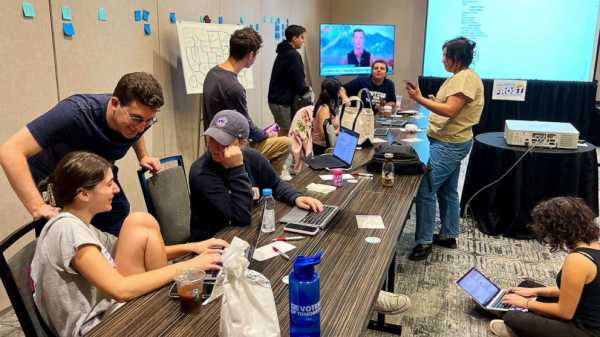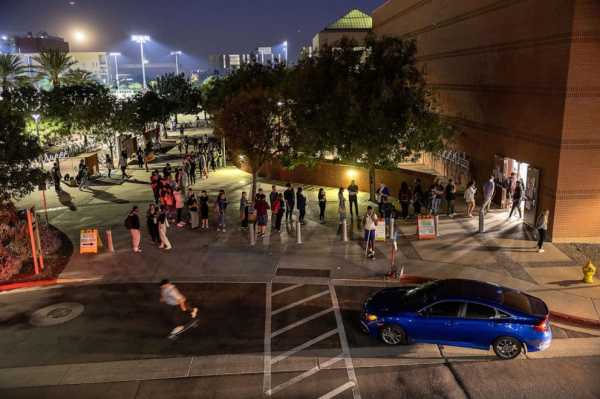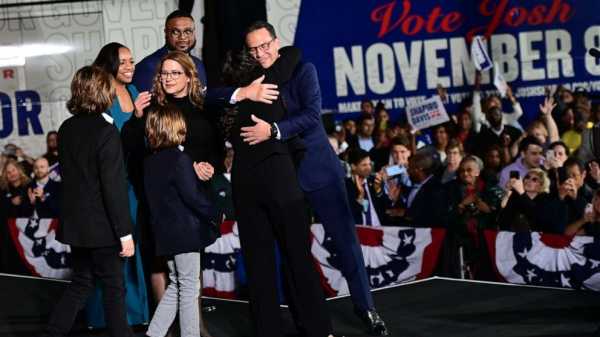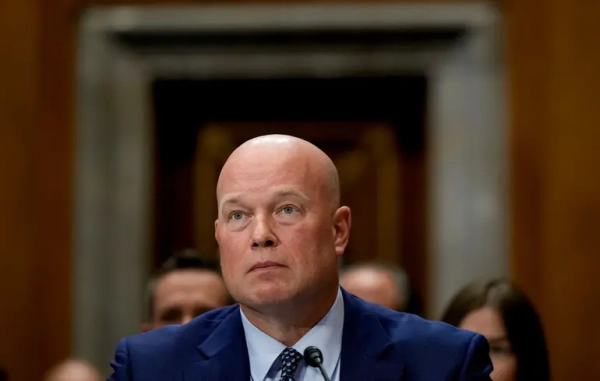Sophia Shapiro recalls the moment the Pennsylvania governor's race was called for her dad, Democrat Josh Shapiro, over Doug Mastriano, his Republican challenger, in one of the earliest indications last week of a thwarted red wave of Republican wins.
"The first thing we said election night when we heard the results — he turned to me and said, 'Gen Z showed up,'" Sophia Shapiro, a longtime youth activist and University of Pittsburgh junior who founded Students for Shapiro, told ABC News.
Her father nodded to youth voters as he took the stage at his watch party in Montgomery County late on Nov. 8: "Voters from Gen Z to our seniors — people from all different walks of life — have given me the honor of a lifetime."
He was right: Exit polling showed that voters 18-to-29 years old — who made up 12% of voters in the gubernatorial race — voted for him instead of Mastriano by more than 44 points.
And while younger voters didn't make up a significantly larger share of the electorate in the 2022 midterms, in Pennsylvania or elsewhere, they did skew more Democratic than past cycles — helping defy historic patterns and widespread predictions that the GOP would sweep back to power.
MORE: Youth voters and independents boosted Democrats this midterm, exit polls show
In the week since the surprising midterm results, much attention has focused on the why — and the who.
"The fact that these youth voters are coming in so strong in an off year is very concerning," Fox News conservative personality Jesse Watters said on the air after the election.
President Joe Biden had his own take, telling reporters the morning after Election Day: "I especially want to thank the young people of this nation."
Governor-elect Josh Shapiro, along with other candidates, youth voters and elections experts, have credited Gen Z — those born from roughly 1997 to 2012 and enveloped in the wider 18- to-29-year-old voting bloc, along with some millennials — for boosting Democratic candidates in the midterms.
ABC News' exit polling shows that younger voters' shift toward Democrats was just one of multiple notable turnout changes: Independents also narrowly favored them over Republicans.

Youth leaders of Voters of Tomorrow huddle in their “war room” in Washington, D.C., ahead of the midterms.Jack Lobel/Voters of Tomorrow
The breakdown of youth voters shifting left
According to the exit polling, 18-to 29-year-olds accounted for 12% of voters in the midterms — the lowest share of the electorate compared to other age groups — but they skewed firmly for Democratic candidates, a trend that has only grown more pronounced in recent years. Nationally, this age category voted in the 2022 election for Democratic House candidates by 28 points over Republican challengers. That's about the same as in 2020 but considerably better than in stronger Republican years like 2014.
Thirty-to-44-year olds were the only other age group who favored Democrats in the House this election, by four points over the Republicans, according to exit polling. This is a decrease, however, from the 2018 House races when this age group favored Democrats by 19 points and in 2016 by seven points.
Forty-five-to-64 year olds preferred Republicans in the House by 10 points and those 65 and up — who made up 28% of the electorate — voted for GOP candidates 12 points over Democrats.
Pointing to these numbers, Harvard Public Opinion Project student chair Alan Zhang told ABC News: "Young voters cancel out every single vote of those over 65. Under 30 and under 40 were the only age group to go to the Democrats and they went overwhelmingly to the Democrats. Without the youth vote, there was no firewall that stopped the red wave from taking over."
Youth voting organizers emphasized that in their view, this cycle was remarkable because of its number of young leaders, including the first Gen Z elected member of Congress, incoming Democratic Rep. Maxwell Frost of Florida — who mobilized peers to cast ballots for "pro-democracy" candidates who stood for top-of-mind issues like abortion access, a robust economy and personal freedoms, an assessment that largely echoes national and state-level issue and exit polling by ABC News.

College students line up to vote on the campus of Arizona State University on Nov. 8, 2022 in Tempe, Ariz.John Moore/Getty Images, FILE
Youth voters' sway in swing states
Exit polling data underlines that in swing states like Arizona, Georgia, Michigan and Wisconsin, the youth vote's strong Democratic slant benefitted the party.
"If you look at a lot of these very close races where Democrats were able to eke out a win, a lot of it was because of Gen Z and millennials, which is really exciting to me," Frost told "GMA3" last week.
In Arizona, 18-to-29-year-old voters favored incumbent Democratic Sen. Mark Kelly by 56 points over Republican Blake Masters, according to the exit polls. In Georgia, youth voters turned out for Democratic Sen. Raphael Warnock by 29 points over his Republican challenger, Herschel Walker. And in Michigan, voters under 30 went for Democratic Gov. Gretchen Whitmer by 32 points over Republican challenger Tudor Dixon.
MORE: Meet the new generation running for office in the midterms
"Here's the thing: Gen Z — half of us are not even old enough to vote yet — the youngest Gen Z-ers are 13 right now. And so what that shows me is that there's a lot of hope and promise in this nation as young people are starting to rise up and really step into their political power," Frost said.
Conservatives, too, have talked about the effect that Gen Z voters had on the Democratic-leaning outcome of a number of races. Karoline Leavitt, a 25-year-old Republican candidate from New Hampshire, tweeted after her 25,000-vote loss to incumbent Rep. Chris Pappas that the GOP "failed miserably" during the midterm elections — the "first major test on Gen Z's electoral impact."
"#GenZ is growing daily AND moving further Left – this will continue to be a colossal challenge for our party if we don't change young hearts & minds," Leavitt wrote in a tweet last week.
Organizers on mobilizing young voters
Frost is already being tapped by national Democrats to campaign in Georgia next week for Warnock ahead of his Dec. 6 runoff election in what could be a signal of Gen Z's growing importance within the party.
"A lot of people underestimated the power of a unified, angry, organized, educated generation," said Jack Lobel of Voters of Tomorrow, a Gen Z-led organization focused on engaging and mobilizing young voters.
"For the campaigns who lost by a big margin, I think more investment in youth voter outreach would have kept them competitive," Lobel said. "For campaigns who lost by a small margin, it might have tipped the scale. And for campaigns who won, it was undoubtedly either because of their own work, because some of them did [and] some of them didn't invest in young voters."
Sophia Shapiro said that when her dad launched his bid for governor last year, she pitched him the idea of youth outreach, led by young people, which led to her Students for Shapiro group.
The Shapiro campaign said the group has more than 50 school chapters and nearly 1,000 members.

Democratic gubernatorial nominee Josh Shapiro embraces his family after giving a victory speech to supporters at the Greater Philadelphia Expo Center on Nov. 8, 2022 in Oaks, Penn.Mark Makela/Getty Images
The group met young people where they were, through social media platforms most popular among Gen Z like Instagram, TikTok and BeReal, to connect with their base; but they also used traditional campaign strategy tactics like text messages, phone-banking and door-knocking.
"You've seen kind of how he's engaged more in TikTok and BeReal and all of that fun Gen Z campaign-centric things over the course of the campaign but also really enabled us to have the flexibility to do it in a way that really reached Gen Z," Sophia Shapiro said of her father.
"I think there's something really powerful and special about being given the power and the initiative to go forth and reach other people and talk to your peers," she said.
Lobel said that in the weeks leading up to Election Day, Voters of Tomorrow contacted young people nationwide — and focused on California, Georgia, Michigan, Pennsylvania and Virginia — over six million times by phone, by text or in person. They had a social media reach of more than 100 million in that same period, including with a digital advertising operation, which targeted young voters in key races with information on LGTBQ rights and abortion access.
"We saw an uptick in involvement after Dobbs," Lobel said, referring to the Supreme Court ruling this summer that overruled national abortion rights. "That was pretty terrifying for us. It also made us realize the fight that we have ahead of us, and it made us realize the importance of making our voices heard and getting involved."
Like others, youth voters care about economy — and abortion
Zhang, from the Harvard Public Opinion Project, said that in his research with 18-to-29-year-olds this fall, inflation and abortion rights were often cited, with abortion mentioned as important particularly by young women.
"I think the issues that are important to Gen Z are the same ones that are important to everybody else, right?" Frost said earlier this year, adding, "The difference, though, is the lens in which we see the issues through. … It's the different perspective, and it's a different sense of urgency."
Zhang argued that the legislative accomplishments of Democrats in Congress this year and the threats to abortion rights "dramatically" shifted the polls more toward Democrats from the spring to the fall, particularly for women and college students.
"What we found heading into the midterms was that at the top of mind for a lot of young voters was the economy and inflation, but in addition to that [were] also issues like abortion and protecting democracy and protecting their rights," Zhang said.
That parallels what ABC News' exit polling and issue polling before and after the midterms found: Voters had major concerns about high inflation and disapproved of Democrats on the economy but also favored them on abortion — another major topic — while rejecting Republicans' election deniers and citing concerns about extremism.
"You have to approach voters with respect. And I don't think that's something we've seen from Republicans, and I think voters recognize that," Zhang said. "Republicans have been stuck at around 30% support among young Americans for a few years now. They were around 30% in 2018 and they're around 30% this year as well. I don't see any reason that number would rise."
Sourse: abcnews.go.com






